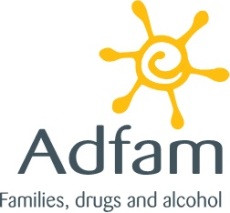Adfam’s Rachael Evans explains how the Care Act will expand and protect the rights of carers in Britain, including those who care for someone as a r esult of drug or alcohol misuse. Lali Gostich from CASA Families, Partners and Friends Service in Islington discusses what the Care Act will mean for services that support people affected by the someone else’s drug or alcohol use.
esult of drug or alcohol misuse. Lali Gostich from CASA Families, Partners and Friends Service in Islington discusses what the Care Act will mean for services that support people affected by the someone else’s drug or alcohol use.
The Care Act, which comes into force on 1 April 2015, will expand and concretise the rights of the 5.67 million carers living in Great Britain, including those who care for someone due to drug or alcohol use. The Act consolidates existing care and support law into a single statute and refocuses it around the person rather than the service, with a shift in Local Authority duty from providing services to meeting needs, and placing individuals at the centre of their offer.
According to the Act, a carer is ‘an adult who provides, or intends to provide, care for another adult.’ This can be someone of any age who provides unpaid support to a family member or friend who could not manage without this help, and includes caring for someone due to illness, disability, mental health issues and drug and alcohol problems. For the first time, carers will now have the same legal rights as those for whom they care: carers will be legally be entitled to receive support and to an assessment of their needs for support. A lower eligibility threshold is also introduced; abolishing the requirement that carers must prove a ‘substantial amount of care on a regular basis’ in order to qualify for assessment.
Those who care for someone because of a drug or alcohol problem are rarely offered – nor do they usually take up – carer’s assessments, possibly because they don’t actually self-identify with the ‘carer’ label. We know that family and friends are a highly beneficial source of support and recovery capital for drug and alcohol users; as such, it is crucial they are given the support they need to be able to continue to provide this invaluable care. The Care Act is a positive reflection of the increased recognition of the role that family and friends can play in caring for and supporting drug and alcohol users. Continue reading
